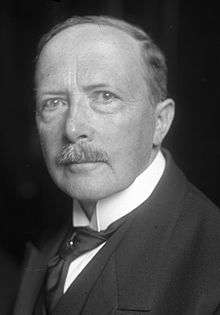Reichsgericht
The Reichsgericht (German: [ˈʁaɪçs.ɡəˌʁɪçt], Reich Court of Justice) was the supreme criminal and civil court in the German Reich from 1879 to 1945. It was based in Leipzig, Germany. The Supreme Court was established when the Reichsjustizgesetze (Imperial Justice Laws) came into effect and it built a widely regarded body of jurisprudence during the period of the German Empire and Weimar Republic.[1]

During the rise of the Third Reich, the Reichsgericht became deeply embroiled in the National Socialist agenda. It even involved itself in matters of Nazi Matrimonial and Contract Law before enactment of the Nuremberg Laws.[2] During and after the Nazi period it received criticism for the ease, and even willingness, with which it provided the highest level of formal legal justification for Nazi programs.[3] Immediately after the end of World War II the Reichsgericht was dissolved, and reformed into the German High Court for the Unified Economic Region, the Allied occupation zones of France, the United Kingdom and the United States.
Building
Located in Leipzig, Saxony, Germany, the building (German: Reichsgerichtsgebäude) was designed by Ludwig Hoffmann and Peter Dybwad, and construction was completed in 1895. It is designed in the Italian renaissance style and features two large courtyards, a central cupola and a large portico at the entrance.[4] The rich decorative gable and sculptures are by Otto Lessing. After the reunification, the former Reichsgericht building was renovated and became the seat of the Bundesverwaltungsgericht (Federal Administrative Court).
List of presidents
| No. | President | Took office | Left office | Time in office | |
|---|---|---|---|---|---|
| 1 | Eduard von Simson (1810–1899) | 1 October 1879 | 1 February 1891 | 11 years, 123 days | |
| 2 | Otto von Oehlschläger (1831–1904) | 1 February 1891 | 1 November 1903 | 12 years, 273 days | |
| 3 | Karl Gutbrod (1844–1905) | 1 November 1903 | 17 April 1905 † | 1 year, 167 days | |
| 4 | Rudolf von Seckendorff (1844–1932) | 18 June 1905 | 1 January 1920 | 14 years, 197 days | |
| 5 | Heinrich Delbrück (1855–1922) | 1 January 1920 | 3 July 1922 † | 2 years, 183 days | |
| 6 | Walter Simons (1861–1937) | 16 October 1922 | 1 April 1929 | 6 years, 167 days | |
| 7 | Erwin Bumke (1874–1945) | 1 April 1929 | 20 April 1945 † | 16 years, 19 days |
References
| Wikimedia Commons has media related to Reichsgericht Leipzig. |
- "Federal Court of Justice Celebrates 50th Anniversary", German Law Journal, November 2000
- Fundstelle: Entscheidungen des Reichsgerichts in Zivilsachen p. 147, 65, 68
- "Federal Court of Justice Celebrates 50th Anniversary", German Law Journal, November 2000
- Reichsgericht, Leipzig

.jpg)


